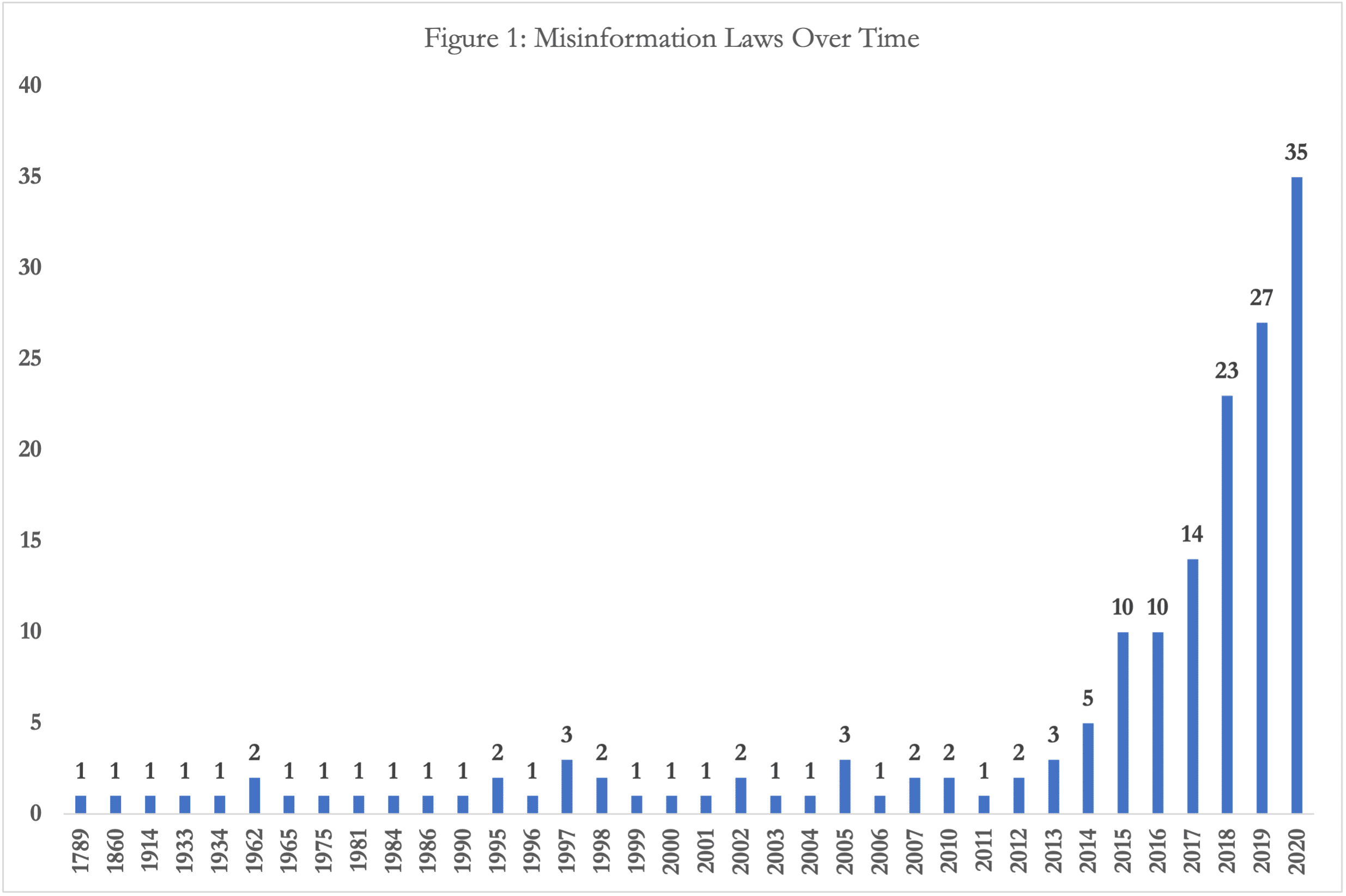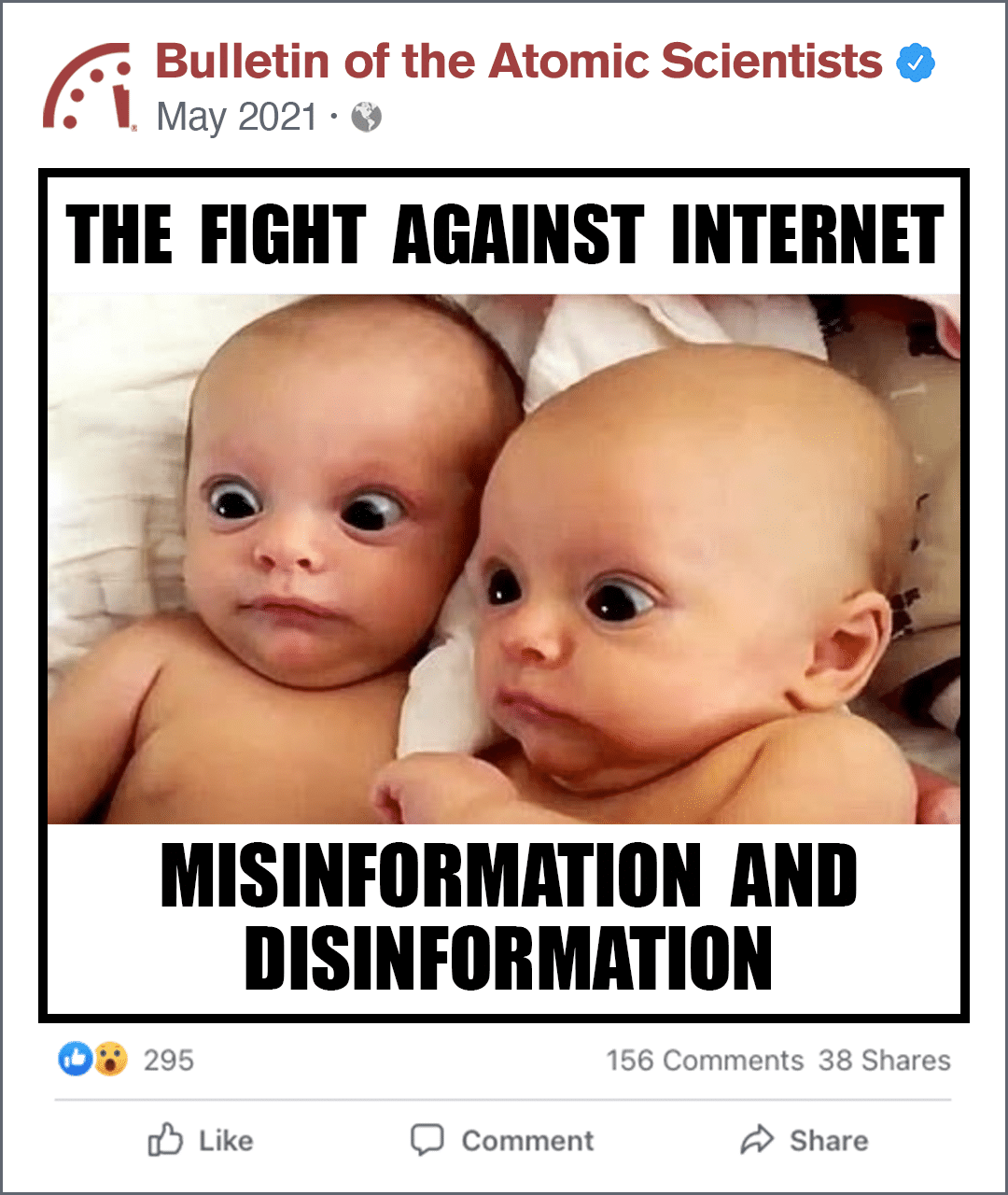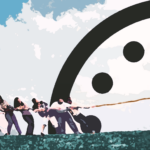Countries have more than 100 laws on the books to combat misinformation. How well do they work?
By Kamya Yadav, Ulaş Erdoğdu, Samikshya Siwakoti, Jacob N. Shapiro, Alicia Wanless | May 13, 2021
Countries have more than 100 laws on the books to combat misinformation. How well do they work?
By Kamya Yadav, Ulaş Erdoğdu, Samikshya Siwakoti, Jacob N. Shapiro, Alicia Wanless | May 13, 2021
The World Health Organization (WHO) is clear: The world isn’t just dealing with the COVID-19 pandemic, it’s also confronting an “infodemic” of misinformation. While researchers, journalists, and officials have highlighted the lies and inaccuracies they’ve seen about the vaccines and other issues, they’ve paid less attention to the ways in which countries are dealing with their misinformation problems. Since 2019 at least 62 laws have been proposed, amended, or implemented that attempt to tackle misinformation, in other words to further regulate speech.
There has been a huge increase in these sorts of laws since 2015. Given the growth in social media use and the media spotlight on disinformation and misinformation, it’s not surprising that lawmakers, policy analysts (Yadav 2020), and internet platforms (Yadav 2021) are increasingly interested in regulating online discourse. Lawmakers aren’t shifting in this direction just because of COVID-19—mis- and disinformation obviously predate the pandemic—but, during the health crisis, governments have been accelerating their efforts to regulate the internet and speech. Both authoritarian and democratic governments made more legal changes on this front in 2020 than in 2019. And in authoritarian states, pandemic-related misinformation has provided a new justification for repressive policies.
To understand this landscape, the Empirical Studies of Conflict lab at Princeton University and the Partnership for Countering Influence Operations at the Carnegie Endowment for International Peace collected information on 174 laws, proposed or implemented, that either directly or indirectly counter misinformation. (See Figure 1.) We drew from existing efforts (Funke and Flamini 2021; LOC 2021) aimed at understanding the legislative landscape around misinformation (LOC 2019) and followed news coverage in order to compile the list, which includes measures dating to 1789. While many of these regulations represent ploys to tamp down on dissent, others are well-intentioned efforts to improve an increasingly complex and global information environment.
What are the laws like?
Misinformation laws serve various purposes. Many are well-intentioned and focus on information in particular areas, such as national security. Or they focus on particular types of harms, such as election interference. As is the case with child pornography laws in the United States (US DOJ 2020) or libel laws, regulating speech to target misinformation is part of a longer history of governments restricting what can be said by whom. While some of the laws we documented are from highly democratic countries like Germany, many are not and have been criticized by civil society groups or others for targeting political opposition figures, activists, or journalists. Other laws seemed too vague or too narrow to be effective against the problem of misinformation in the first place.
Some laws are geared toward prosecuting individuals for spreading misinformation that states cast as threats to their national security or public safety. For example, Reuters wrote in 2018 about a Bangladeshi law that punishes people who electronically publish material that “may cause any deterioration in law and order” (Reuters 2018). In 2019, Burkina Faso passed a measure to counter terrorism, organized crime, and fake news and to suppress efforts to “demoralize” the Burkinabe armed forces (LOC 2019).
Other laws created loopholes which governments can misuse. For instance, the Russian government amended the country’s criminal code in 2020 to penalize people who disseminate false information during “emergencies” such as the COVID-19 pandemic (Amnesty International 2020). But in Russia, where government opponents can run into legal trouble or worse, critics like the human rights group Amnesty International panned the measure as a bill to clamp down on government criticism.
Most of the measures we cataloged were vaguely worded.
And even in more democratic countries, vague wording has made it difficult for authorities to strike a balance between fighting misinformation and censorship. For instance, in Germany, critics of the country’s landmark 2017 Network Enforcement Act have underscored that this law could “stifle political speech or be used as a model for authoritarian governments to crack down on online dissent.” Although the law is meant to tamp down on hate speech, critics are concerned that because the law’s definition of hate speech is too vague and because it imposes heavy fines on social media companies, the measure could result in “unaccountable, overbroad censorship (HRC 2018).” Moreover, the German law may be providing cover for authoritarian regimes seeking to crack down on opposition (Mchangama and Fiss 2019).
Many of the laws we documented are likely inadequate responses to the problem of misinformation, which can involve a wide variety of people and events over time. That’s because many target specific types of information or people, for instance national security information in Burkina Faso (Boring 2019) or political candidates in Chile (Jenner 2018). Other laws cover specific events, like election campaigns in Argentina (Rodriguez-Ferrand 2019).
While most laws or regulations in our dataset either impose fines or jail time for individuals found responsible for spreading misinformation, some address companies or social media platforms. A Pakistani regulation calls for companies to be taken offline (Medianama, n.d.) for violations, and an Australian law levies fines on corporations responsible for disseminating false information (Australian Government, n.d.).
The COVID-19 pandemic is a case study for how effective laws regulating speech have been at curtailing misinformation. Pandemic misinformation has been as widespread as the virus itself; in our research, we found over 5,600 unique stories comprising COVID-related misinformation (Siwakoti et al. 2021). This, despite the dozens of strict laws that countries have introduced to target misinformation.

Dealing with COVID-19.
Some countries have decided to fight pandemic misinformation on legal grounds by introducing new laws, oftentimes under a state of emergency, or by amending existing laws to specifically target coronavirus-related misinformation. In total, we identified 13 countries that introduced new laws, most of which have authoritarian regimes or have been experiencing authoritarianism in recent years. In other cases, countries have relied on existing laws to prosecute alleged misinformation.
Zimbabwe introduced a new law last March that specifically penalizes publication of false news “about any public officer, official or enforcement officer involved with … the national lockdown” (Government of Zimbabwe 2020). That same month, the Hungarian government introduced the “Law on Protection against the Coronavirus” under a state of emergency; the law punishes anyone publishing false information with five years in prison (Government of Hungary 2020). The following month, Jordanian King Abdullah activated an emergency defense law under which sharing news that would “cause panic” about the pandemic can be punished with up to three years in prison (Prime Minister of Jordan 2020; HRW 2020). Also in April, the Algerian government amended its penal code to criminalize the spread of fake news that undermines public security and national unity (Al Jazeera 2020).
In Turkey and India, however, laws that predated the pandemic for regulating speech are being used as mechanisms of control during the health crisis. In India, prominent legal analysts have argued that a section of the penal code, which dates back to 1860, can be invoked against anyone “making, publishing or circulating any statement, rumor, or report which may cause fear or alarm to the public …” (Jain and Singh 2020). The punishment can include up to three years imprisonment, a fine, or both. Already in India, over 100 people in West Bengal, 46 in Assam, and 179 in Rajasthan have been arrested under existing provisions such as the Indian penal code, the Disaster Management Act of 2005, and the Epidemic Diseases Act of 1897 (Hindustan Times 2020).
Meanwhile in Turkey, within the first weeks of the coronavirus pandemic, authorities used the country’s criminal law provisions to detain hundreds of people for “false and provocative” social media posts on the pandemic (Reuters 2020), including journalists and doctors (Amnesty International 2020b) who were critical of the government (CIVICUS 2020). Turkey also adopted a new “Social Media Law” last summer (Cantekin 2020). It requires social media companies to appoint a local representative, store data locally, and fulfill content removal requests. Violators face a five-tiered sanctions regime, which includes financial penalties, advertising bans, and bandwidth restrictions.
Critics fear that the law may be weaponized by the government to curb the freedom of speech (Sari 2020; Heinrich 2020), whereas the Turkish officials present the law as a necessary step to protect privacy, rights, and freedom in the country (Al Jazeera 2021). As of March 2021, major social media companies, including Facebook, VKontakte (VK), YouTube, TikTok, LinkedIn, Dailymotion, and Twitter, have appointed local representatives in the country (TRT World 2021). The platforms acted to avoid the sanctions, which include a fine of 40 million Turkish liras ($5.4 million) and advertisement bans.
In Pakistan, preexisting laws have been used to target journalists during the pandemic. Last September, the Pakistani journalist Bilal Farooq was arrested on charges of spreading hateful content against the military on social media (Ali 2020). Two other journalists were tortured by paramilitary forces for their coverage of poor conditions at a coronavirus quarantine center (Radio Mashaal 2020). Anti-terrorism forces accused the journalists of spreading fake news on social media and disrupting social order.
In some places civil society and opposition groups mobilized to prevent new laws regulating freedom of speech and fake news. In the spring of last year, a member of the Tunisian parliament proposed a law to combat online disinformation during the pandemic that could impact “national security and order” (Access Now 2020). The proposal triggered an immediate public backlash and mobilization of the civil society. As a result, deputies from different groups withdrew their signatures including its author. Similarly, in Paraguay, a draft law was withdrawn by its author after it sparked criticism that it was too broad (Lubianco 2020).
Where is this all going?
The problem of COVID-19 misinformation has shined a spotlight on the laws that both democratic and authoritarian countries use to regulate the information environment. As governments are grappling with how to address a new kind of commons, it should not be surprising that in some places officials have seen an opportunity to further lock in their power and constrain dissent. And even where lawmakers have good intentions, many information laws target individuals as opposed to trying to shape the ecosystem itself.
In a global information environment, the growing patchwork of country-level laws governments have introduced or implemented before and during the pandemic will be difficult for companies like the big social media platforms to navigate. In authoritarian states, the laws represent another means of controlling speech, especially dissent. Large international organizations like the European Union, the Organization for Economic Cooperation and Development, or the United Nations are key to establishing norms of online speech and addressing the problem of misinformation and disinformation in a systematic manner. A new proposal by the European Commission to address misinformation and other Internet issues, the Digital Services Act, is a step in this direction (European Commission, n.d.). Unfortunately, there are plenty of instances of problematic and localized approaches.
Given the questionable success of laws against misinformation and ease with which authoritarian regimes can repurpose them to clamp down on political speech, it is important to study this issue more. While there is a large research community shedding light on misinformation, important institutional gaps remain. Most critically, society currently lacks an ecosystem of independent research institutions that can fill the gaps between what companies can do themselves and what academics are able to do given data access constraints and career incentives (Shapiro et al. 2020). Fostering such institutions would help democratic nations around the world better understand the tradeoffs counter-misinformation laws are meant to address.
Editor’s note: The research team at Princeton’s ESOC lab is supported by Microsoft Research.To view our regulations on misinformation dataset and the corresponding codebook please visit: https://docs.google.com/spreadsheets/d/1h6HRu-Q5EBqURJytoOOJgjkVFd6SFWVb/edit#gid=528020458
The authors would like to acknowledge a number of people who contributed to the research underlying this piece, including, Phillip C. Arceneaux, Xin Lin, Robert Myak, Giorgio Musto, Jacob Rob, Adam Wickham, Enrique Zúñiga Gonzalez, and Luca Zanotti.
Together, we make the world safer.
The Bulletin elevates expert voices above the noise. But as an independent nonprofit organization, our operations depend on the support of readers like you. Help us continue to deliver quality journalism that holds leaders accountable. Your support of our work at any level is important. In return, we promise our coverage will be understandable, influential, vigilant, solution-oriented, and fair-minded. Together we can make a difference.
Keywords: 2024 election, COVID-19, LAWS, authoritarian countries, democratic countries, dissent, fake news, freedom of speech, misinformation
Topics: Disruptive Technologies

























